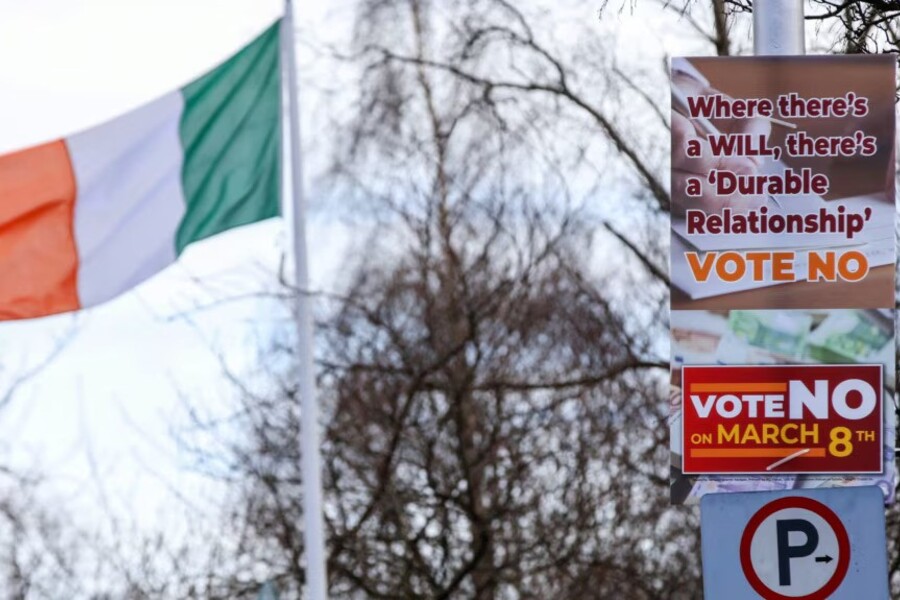In a landmark event, Ireland, a nation renowned for its progressive strides in social reforms, faced a significant setback as two pivotal referenda aimed at redefining the roles of women and the concept of family were rejected. This outcome has sparked a nationwide introspection about gender equality, family dynamics, and societal values. The referenda, held in early March 2024, sought to amend archaic constitutional language, reflecting Ireland’s transformation from a deeply conservative society to a beacon of social liberalism. Despite the push from the government and Prime Minister Leo Varadkar, the Irish people decided against these changes, signaling a complex interplay of societal beliefs and concerns about the implications of such amendments.
The first amendment aimed to broaden the definition of family beyond the traditional framework founded on marriage, to include “durable relationships” like cohabiting couples and their children. This was seen as an attempt to acknowledge and legitimize the diverse forms of family structures present in modern Irish society.
The second proposed amendment sought to eliminate outdated language regarding women’s roles, specifically the notion that a woman’s place is in the home. It aimed to replace this with a more inclusive recognition of the care provided by family members for one another, thus broadening the scope of care beyond gendered expectations.
The rejection of these amendments was confirmed in March 2024, with Prime Minister Varadkar acknowledging the defeat as “two wallops” to his government’s efforts. This outcome was unexpected, particularly given the wide political support and initial polls suggesting favorable public opinion. The defeat prompted a period of reflection on the part of the government and the Irish people about the nature of family and women’s roles in society.
The reasons behind the rejection are multifaceted. Many voters expressed confusion over the wording of the amendments and concerns about potential unintended consequences. Critics argued that the proposals were poorly communicated, leading to uncertainty and apprehension about changing long-standing constitutional language.
Some feared that the amendments might undermine traditional family values or lead to a dilution of the state’s obligations towards care and support. Others felt that the proposals did not go far enough in addressing the complexities of modern caregiving and family structures, including the needs of disabled persons and social justice advocates.
The referenda’s outcomes have ignited a debate about Ireland’s social direction. On one hand, the rejection reflects a cautious approach by the electorate towards constitutional changes affecting foundational societal concepts. On the other hand, it underscores the challenges of balancing respect for traditional values with the need to adapt to changing social realities.
The debate also highlights the importance of clear communication and public engagement on complex issues. The government’s acknowledgment of its failure to convince the majority underscores the necessity for thorough public consultation and education in future reform efforts.
Despite this setback, it’s crucial to recognize the significant strides Ireland has made toward becoming a more inclusive and socially liberal society. From legalizing divorce and same-sex marriage to repealing abortion bans, Ireland has demonstrated a capacity for profound social change. The rejection of these particular amendments does not halt this progress but rather emphasizes the need for continued dialogue and reflection on how best to evolve while respecting diverse perspectives.
The rejection of the constitutional amendments on family and women’s roles in Ireland serves as a poignant reminder of the complexities inherent in social reform. It reflects the delicate balance between tradition and progress, the necessity of clear communication in public policy, and the enduring importance of family and gender roles in Irish society. As Ireland continues to navigate its path forward, these referenda will undoubtedly serve as a critical point of reflection in its ongoing journey towards equality and inclusivity.



















![Fan Expo Chicago [Convention], Donald E. Stephens Convention Center, 16 Aug What You Need to Know](https://www.thefreemanonline.org/wp-content/uploads/2024/09/Fan-Expo-Chicago-Convention-Donald-E.-Stephens-Convention-Center-16-Aug-What-You-Need-to-Know-74x55.jpg)
![Error [err_http_headers_sent] Cannot Set Headers After They Are Sent to the Client How to Fix](https://www.thefreemanonline.org/wp-content/uploads/2024/09/Error-err_http_headers_sent-Cannot-Set-Headers-After-They-Are-Sent-to-the-Client-How-to-Fix--74x55.jpg)
